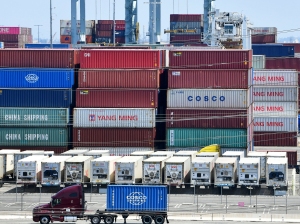Struggling US importers Granted 90-day Duty Deferment
By Chris Gillis, American Shipper
 April 20, 2020 - Under authority of the White House, Customs and Border Protection (CBP) will allow U.S. importers of certain goods to defer their payments of duties, taxes and fees for the next 90 days, starting April 20. April 20, 2020 - Under authority of the White House, Customs and Border Protection (CBP) will allow U.S. importers of certain goods to defer their payments of duties, taxes and fees for the next 90 days, starting April 20.
The temporary duty deferment was included in an executive order signed by President Trump on Friday, April 17, to help American businesses cope with the economic fallout from the COVID-19 pandemic.
“This payment flexibility will be available only for importers with a significant financial hardship and will apply to payments for goods imported in March and April,” CBP said in a press release on Sunday, April 19.
However, the deferment will not apply to imports currently subject to U.S. anti-dumping and countervailing duties or tariffs resulting from the Section 201, 232 and 301 trade remedies. Those duties must still be paid on time by importers, the agency said.
The nation’s customs brokers are expected to work with their importer clients in the coming days to determine which imports qualify for duty deferment.
“For those that are then able to benefit from the 90-day suspension, we will have to dot our ‘i’s’ and cross our ‘t’s’ to ensure that we schedule payments accordingly within the allotted time frames,” Grabriel Rodriguez, president of Doral, Florida-based A Customs Brokerage and an officer with the Florida Customs Brokers and Forwarders Association, told American Shipper.
“This moratorium will be a little bit of a burden administratively due to the conditions under which it is being applied and their short-term timeframe, but we know it is going to be a great financial benefit to our importers.”
“This is a big deal for everyone,” said Amy Magnus, president of the Washington, D.C.-based National Customs Brokers and Forwarders Association of America (NCBFAA). “As a broker, we will have to figure out how to push out the duty payments 90 days for those entries that can be delayed.”
Magnus, who also serves as director of customs affairs and compliance for Saint Albans, Vermont-based A.N. Deringer, said the deferment does not absolve qualifying importers from ultimately paying those duties.
CBP said it is still processing duties, taxes and fees on imports during the national health crisis, adding that it will not return deposits of estimated duties, taxes and fees that have already been paid.
The agency enforces about 500 U.S. trade laws and regulations on behalf of 49 government agencies and remains the second-largest source of revenue for the U.S. government behind income taxes.
SOURCE: American Shipper |